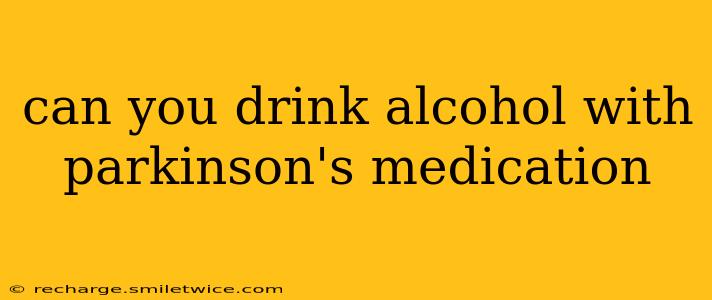Can You Drink Alcohol With Parkinson's Medication? A Comprehensive Guide
Parkinson's disease significantly impacts daily life, and managing medications is a crucial aspect of care. Many patients wonder about the interaction between their Parkinson's medication and alcohol consumption. The short answer is complex: it depends. There's no blanket yes or no, and the safest approach involves careful consideration and consultation with your doctor or neurologist.
This article will delve into the intricacies of alcohol consumption alongside Parkinson's medication, addressing common questions and concerns. We will explore the potential risks, benefits (if any), and provide guidance on making informed decisions.
What are the Potential Risks of Mixing Alcohol and Parkinson's Medication?
The risks associated with combining alcohol and Parkinson's medication are multifaceted and depend on several factors, including:
- Type of Parkinson's medication: Different medications interact differently with alcohol. Some may experience amplified side effects, while others may have their efficacy reduced. This is especially crucial with Levodopa, a common medication.
- Dosage: Both the dosage of your Parkinson's medication and the amount of alcohol consumed play a role in the potential for adverse effects. Higher doses of either can increase the risk of complications.
- Individual sensitivity: People react differently to medications and alcohol. Some individuals are more sensitive than others, experiencing more pronounced side effects.
- Pre-existing conditions: Other health conditions can influence the interaction between alcohol and medication. Liver function, for instance, is vital to processing both alcohol and medication.
Can Alcohol Worsen Parkinson's Symptoms?
While not directly causing Parkinson's, alcohol can exacerbate existing symptoms. These symptoms can include:
- Increased tremors or rigidity: Alcohol can disrupt the delicate balance your medication aims to achieve, potentially leading to worsened motor control.
- Dizziness and falls: The combination can increase the risk of falls, a significant concern for individuals with Parkinson's.
- Cognitive impairment: Alcohol can further impair cognitive function, already potentially affected by the disease.
- Sleep disturbances: Alcohol can disrupt sleep patterns, making existing sleep issues worse.
- Dehydration: Alcohol is a diuretic, potentially worsening dehydration, which can negatively impact medication absorption and overall health.
Does Alcohol Interact With Levodopa?
Levodopa is a cornerstone medication for many individuals with Parkinson's. Alcohol can interfere with its absorption and effectiveness, potentially leading to fluctuations in symptom control. It's crucial to discuss alcohol consumption with your doctor if you are taking Levodopa.
Can Alcohol Affect the Effectiveness of My Parkinson's Medication?
Yes, alcohol can impact the effectiveness of your Parkinson's medication. This is because alcohol can affect the way your body absorbs, metabolizes, and processes your medication. This can lead to either a reduction in the medication's efficacy or an increase in side effects. It's vital to consult your healthcare provider for personalized advice.
What Should I Do If I'm Concerned About Mixing Alcohol and My Parkinson's Medication?
The most critical step is open communication with your doctor or neurologist. They can assess your specific situation, medication regimen, and overall health to provide personalized guidance. Don't hesitate to discuss your concerns and any potential risks. They can help you weigh the benefits against the risks, and determine a safe course of action.
Conclusion
Navigating the complexities of Parkinson's disease requires careful management of medications and lifestyle choices. While social situations may involve alcohol, the potential risks of combining it with Parkinson's medication should be thoroughly considered. Always prioritize open communication with your healthcare provider to ensure your safety and well-being. Remember, responsible decision-making is key to managing your condition effectively.
